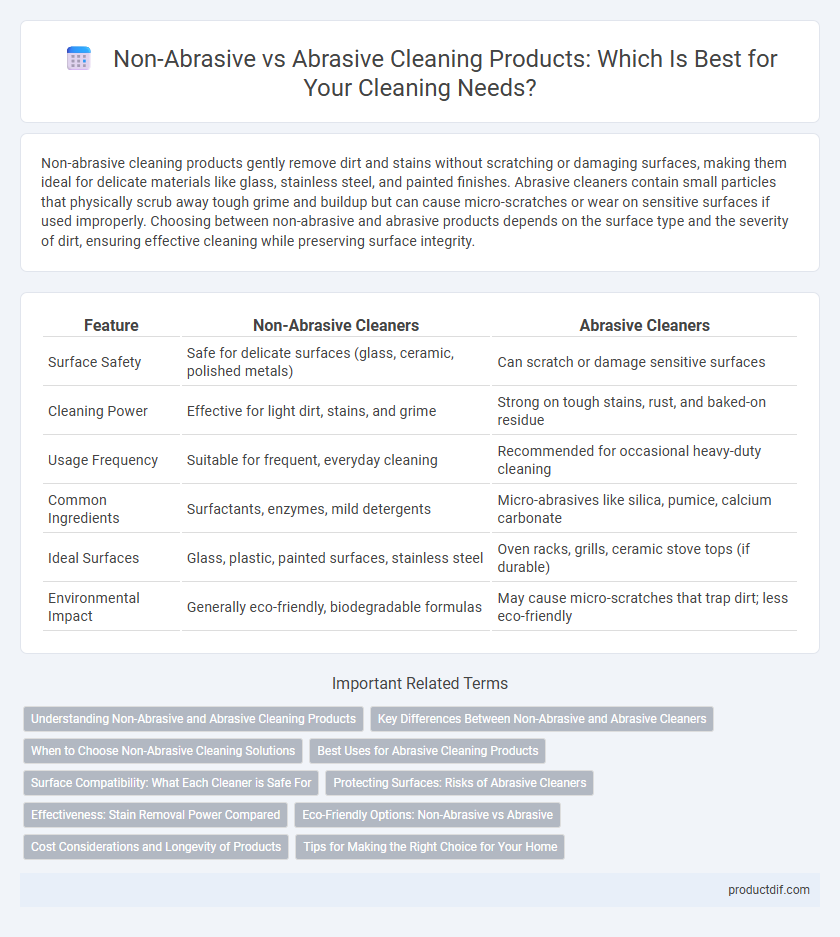Non-abrasive cleaning products gently remove dirt and stains without scratching or damaging surfaces, making them ideal for delicate materials like glass, stainless steel, and painted finishes. Abrasive cleaners contain small particles that physically scrub away tough grime and buildup but can cause micro-scratches or wear on sensitive surfaces if used improperly. Choosing between non-abrasive and abrasive products depends on the surface type and the severity of dirt, ensuring effective cleaning while preserving surface integrity.
Table of Comparison
| Feature | Non-Abrasive Cleaners | Abrasive Cleaners |
|---|---|---|
| Surface Safety | Safe for delicate surfaces (glass, ceramic, polished metals) | Can scratch or damage sensitive surfaces |
| Cleaning Power | Effective for light dirt, stains, and grime | Strong on tough stains, rust, and baked-on residue |
| Usage Frequency | Suitable for frequent, everyday cleaning | Recommended for occasional heavy-duty cleaning |
| Common Ingredients | Surfactants, enzymes, mild detergents | Micro-abrasives like silica, pumice, calcium carbonate |
| Ideal Surfaces | Glass, plastic, painted surfaces, stainless steel | Oven racks, grills, ceramic stove tops (if durable) |
| Environmental Impact | Generally eco-friendly, biodegradable formulas | May cause micro-scratches that trap dirt; less eco-friendly |
Understanding Non-Abrasive and Abrasive Cleaning Products
Non-abrasive cleaning products use gentle ingredients like surfactants and enzymes to remove dirt without scratching surfaces, making them ideal for delicate materials such as glass, polished metals, and painted finishes. Abrasive cleaning products contain granular substances like silica or calcium carbonate that physically scrub away tough grime, suitable for heavy-duty cleaning on durable surfaces like stone, ceramic, and metal cookware. Understanding the difference helps select the right product to preserve surface integrity while effectively removing contaminants.
Key Differences Between Non-Abrasive and Abrasive Cleaners
Non-abrasive cleaners use gentle formulas that avoid scratching surfaces, making them ideal for delicate materials such as glass, stainless steel, and painted finishes. Abrasive cleaners contain coarse particles that physically scrub off stubborn dirt and grime, but they can damage sensitive surfaces or leave micro-scratches. Choosing between non-abrasive and abrasive cleaners depends on the surface type and cleaning intensity required for optimal maintenance and longevity.
When to Choose Non-Abrasive Cleaning Solutions
Non-abrasive cleaning solutions are ideal for delicate surfaces such as glass, polished metals, and painted finishes where scratch prevention is critical. These products effectively remove dirt and grime without damaging surface integrity or causing microabrasions, making them suitable for regular maintenance of sensitive materials. Selecting non-abrasive cleaners preserves the longevity and aesthetic of premium surfaces while ensuring a thorough clean.
Best Uses for Abrasive Cleaning Products
Abrasive cleaning products excel in tackling tough grime, rust, and baked-on food residues on durable surfaces like metal cookware and ceramic tiles. Their gritty texture effectively removes stubborn stains and buildup, making them ideal for heavy-duty cleaning tasks in kitchens and industrial settings. Caution is necessary to avoid damage on delicate surfaces, as abrasives can scratch or wear down finishes.
Surface Compatibility: What Each Cleaner is Safe For
Non-abrasive cleaning products are designed to be gentle on delicate surfaces such as glass, stainless steel, and painted finishes, preventing scratches and preserving the integrity of the material. Abrasive cleaners contain granular particles or harsh chemicals that effectively remove tough stains on hard surfaces like ceramic tiles, metal cookware, and stone countertops but may cause damage to softer materials. Choosing the appropriate cleaner based on surface compatibility ensures effective cleaning while maintaining the durability and appearance of various household items.
Protecting Surfaces: Risks of Abrasive Cleaners
Non-abrasive cleaning products protect delicate surfaces by using gentle ingredients that won't scratch or damage finishes on materials like glass, stainless steel, or painted wood. Abrasive cleaners contain particles or chemicals that can erode coatings, leave visible scratches, and weaken surface integrity over time, increasing repair costs. Choosing non-abrasive options reduces the risk of permanent damage while maintaining cleanliness and surface lifespan.
Effectiveness: Stain Removal Power Compared
Non-abrasive cleaning products excel in removing light stains and delicate surfaces without causing scratches, making them ideal for glass and polished finishes. Abrasive cleaners contain gritty particles that enhance stain removal power by physically scrubbing away tough grime and stubborn residues on hard surfaces like tiles and cookware. Choosing between these options depends on the surface durability and the severity of the stain to achieve optimal cleaning results.
Eco-Friendly Options: Non-Abrasive vs Abrasive
Eco-friendly cleaning products favor non-abrasive ingredients such as plant-based surfactants and biodegradable enzymes that effectively remove dirt without damaging surfaces or harming the environment. Abrasive cleaners often contain microplastics or harsh chemicals that contribute to pollution and can degrade natural ecosystems. Choosing non-abrasive options reduces ecological impact by minimizing toxic waste and supporting sustainable cleaning practices.
Cost Considerations and Longevity of Products
Non-abrasive cleaning products typically cost more upfront but offer longer-lasting use by preserving surface integrity and minimizing wear, reducing the need for frequent replacements. Abrasive cleaners are generally cheaper initially but may cause surface damage over time, leading to higher maintenance costs and shorter product lifespan. Evaluating cost considerations and product longevity is crucial for selecting the most economical and effective cleaning solution based on intended use and surface type.
Tips for Making the Right Choice for Your Home
Choosing between non-abrasive and abrasive cleaning products depends on the surface type and level of dirt or stains. Non-abrasive cleaners are ideal for delicate surfaces like glass, stainless steel, and painted finishes, preventing scratches and preserving the material's integrity. Abrasive cleaners effectively remove tough grime and stains from durable surfaces such as tiles and cookware but should be used cautiously to avoid damage.
Non-abrasive vs Abrasive Infographic

 productdif.com
productdif.com